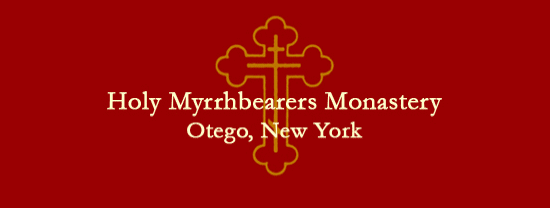
Frequently Asked Questions
Note: Some of these are questions we have asked ourselves... If you have a question you would like to ask us, just write to orders@holymyrrhbearers.com .
Q. When do you Orthodox celebrate Christmas? January 6th or January 7th?
A. The Orthodox celebrate Christmas on December 25th, as all other Christians do. However, there are many Orthodox Christians, including those in Russia and in the Holy Land, who keep December 25th on the old calendar (see following FAQ). Countries throughout the world have gradually adopted this "new calendar:" The United States changed its dates to the corrected one in the 18th century; Russia in the 20th century. Religious observances tend to remain traditional, so while all Orthodox service books show that Christmas is celebrated on December 25th, the 25th is kept 13 days later (January 7th) on the old calendar. A little over 100 years ago, the Old Calendar was only 12 days behind, and some literature remembers the days when Orthodox Christians celebrated Christmas on January 6th when Epiphany (or Theophany) is celebrated (and which likewise is now kept 13 days later for those who still observe the "old" calendar).
Q. Why does Orthodox Easter come so much later than "Western" Easter some years?
A. In order to keep unity amongst the churches, all Orthodox (except those who are in the Church of Finland) "go Old Calendar" for Pascha (Easter). That is to say, we no longer calculate the Spring Equinox by the sun, but by a calendar that is now 13 days "out of sync" with nature. There are many historical, political and emotional reasons for this, and it is the tradition of the Church to move slowly so that there can be a consensus of opinion when a change is made. It seems obvious that we should want to stay in tune with the rhythms of God's creation, but when that obvious correction is imposed on people by force, it violates the greater Divine principles of love and freedom.
Q: Why would a monastery have a web site?
A: When we first set up this web site, this seemed to be a burning question to a number of people. Now several years later, just about every monastery has a web site! Still, our reasons remain the same: As monastics, we struggle with planting a monastery in a country where there is no local village of Orthodox ready to support us; no nearby visible means of support. For us, the internet has been a God-send -- His way of helping us "bridge the gap." We do not have to take sisters from their quiet work to lead tour groups or run a store. We can live in physical solitude. By not having television or radio or using the sound option for our computers, we do not find our silence violated. In addition, we can easily check up on crisis news such as approaching blizzards and tornadoes. We can share our lives with others through publishing and correspondence as monastics have for centuries, and we can find a market for our products without sending sisters to the local bazaar (a duty that has plagued monastics for millennia). In many ways, it is the best of both worlds.
However, we have found we do need to make choices: at least for us, in order to maintain the atmosphere of prayer and silence we want, some time ago we decided to take games off the computer; we don't have unlimited hours for surfing the internet, and we don't have private e-mail accounts. In addition, we do not carry our portable phones around with us, nor do we have cell-phones, and the use of our fax machine is limited to necessary business.
Design by Dick Fish, with T.J. Leach. Web site constructed by Volha Charnysh.